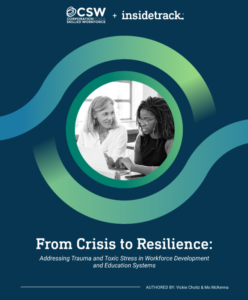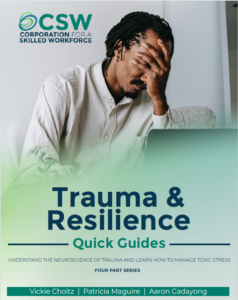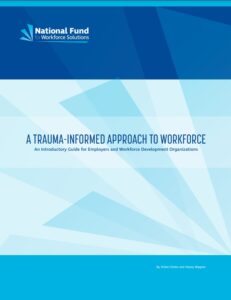The CSW Trauma and Resilience at Work team partners with organizations to build workplaces that are trauma-informed, healing-centered, culturally responsive, and resilience-focused. We help reduce the stigma around trauma and mental health, provide education across all organizational levels, and promote policies and practices that support sustainable mental well-being at work.
In 2025, we are seeing increasingly higher levels of stress and trauma – due to greater economic uncertainty, political polarization, and significant cuts to funding and staff that provide critical social supports. The Trauma & Resilience at Work team is prioritizing collective care and resilience building, especially in the workplace, from public agencies to private companies to nonprofit organizations. With self-care, the work is at the individual level. Collective care engages groups – work teams, organizations, communities – to implement strategies that strengthen the mental health of each member of the group. Both self-care and collective care are important, and CSW will be sharing strategies and examples with our partners, training participants, and readers.
Who We Work With
We work with agencies and organizations in workforce development, human services, adult and postsecondary education, nonprofit employment and training, and related sectors, and well as private-sector employers. We do this work in the context of advancing worker success, racial equity and inclusion, job quality, economic mobility, and fair and safe workplaces.
How We Do It
- Training Initiatives
- Strategy Development
- Organizational Coaching
- Research & Field-building
How We’re Making Change
Training Initiatives
We work with funders, agencies, and organizations to co-create training initiatives that help staff develop and adopt trauma-responsive skills and organizations cultivate healing-centered and resilience-building cultures. We always focus on trauma and resilience, for both customers/students and staff, as well as how organizations and communities should be more supportive as we also take care of ourselves.
Organizational Coaching
It is not enough for staff and employees to be trauma-informed; organizational cultures and systems need to adopt this approach as well. This is why CSW also works with organizations to assess their current level of integrating trauma-informed and resilience-building practices and strategies; support them in creating action plans to advance in this journey; and provide technical assistance and coaching.
Strategy Development
CSW works with funders, state and local agencies, organizations, and employers to develop strategies for advancing trauma-informed and resilience-building approaches in their states, organizations, companies, and in the fields of workforce development, human services, adult and postsecondary education, nonprofit employment and training, and related sectors.
Research & Field-Building
Our team conducts research to better understand how trauma affects workforce development participants, staff, and organizations. We also study how our interventions improve mental health, wellness, employment, and economic success. Our team collaborates extensively with our partners across the country to advance trauma-informed and resilience-building practices, organizations, and employers.
81% of workers reported that they will be looking for workplaces that support mental health in the future.
Featured Case Study: Detroit at Work
CSW has provided trauma and resilience training and organizational coaching for the Detroit at Work public workforce development system since May 2021. In the first three years, CSW staff and consultants provided training and coaching. We also cultivated and supported a group of about 30 “Ambassadors” across the system of nine career centers to sustain and deepen the trauma-informed work in their centers between trainings.
Data from last year’s survey report showed that staff had significantly higher compassion satisfaction (pleasure and satisfaction from helping others) from the second year to the third year. There was a 10 percent increase in high compassion satisfaction (compared to moderate and low), from 51.2 percent in 2023 to 61.5% in 2024. Job burnout remained low at around 64 to 65 percent.
Over the last three years, there have been consistent and sometimes significant increases on measures including:
- More staff said their organization takes time to address the impact of traumatic stress at work in 2024 vs. 2021
- More staff felt they had the flexibility to respond to traumatic stress experienced by themselves, customers, or colleagues in 2024 vs. 2021
- More staff agreed that recognizing and responding to trauma is an important part of their role in 2024 vs. 2021
In 2024, 77.3 percent agreed or strongly agreed that CSW’s T&R training sessions were useful and have used what they have learned in their professional work. When asked about organizational changes, 59.1 percent stated that there have been improvements in trauma-informed practices and resilience building. A total of 81.9 percent indicated that they agree or strongly agree that they would recommend the training they have received to others.
In 2025, CSW is building from this foundation and implementing a Train-the-Trainer model with Detroit at Work and DESC staff. The CSW T&R team is training the Ambassadors to deliver our core training curricula on Introduction to Trauma and Healing; Collective Trauma and Building Resilience; Vicarious Trauma, Self Care, and Collective Care; and Cultivating Trauma-Informed, Healing-Centered Organizations and Supervision.”
Feedback from training and survey participants includes:
- “I like the labs that are available. I find them to be very helpful in situations of the people we serve. It is nice to get feedback on the different situations and how different centers/coworkers would handle that situation.”
- “I like the outcomes and changes that our Ambassadors have brought about here.”
- “This training was very informational and allowed me an opportunity to reflect on how I manage my day to day engagement with our customers. Sometimes I need to take time and reflect. Use my Affirmations and take a break.”
- “Revisiting all I have learned helps to validate that I am still keeping myself accountable to my participants and co-workers.”
Recent Clients & Selected Work
- Detroit at Work Trauma-Informed and Healing Centered Train-the-Trainer Ambassador Program Detroit Employment Solutions Corporation
- Trauma-Informed and Resilient Somerville Somerville Job Creation and Retention Trust
- Trauma-Informed Ambassador Program State of Michigan NEAR Collaborative
- From Crisis to Resilience: Addressing Trauma and Toxic Stress in Workforce Development and Education Systems CSW and InsideTrack
- Introduction to Culturally Responsive Trauma-Informed and Resilience Building Practices EASTBAYWorks (EBW)
- Strengthening the Substance Use Workforce by Addressing Secondary Trauma through Healing Centered Restorative EngagementNew Hampshire Technical Assistance Center for Substance Use Disorders
- A Trauma-Informed Approach to WorkforceNational Fund for Workforce Solutions
- Trauma-informed Training and Resilience-building with the Workforce SystemNational Governors Association
- Workplace Mental Health WorkgroupMichigan Department of Labor and Economic Opportunity
Featured Reports & Publications
Workplace Mental Health
CSW & Michigan Department of Labor and Economic Opportunity
A Trauma-Informed Approach to Workforce
CSW & National Fund for Workforce Solutions
Recent Posts on Trauma & Resilience

What are ACEs and Why Do They Matter in the Workplace?
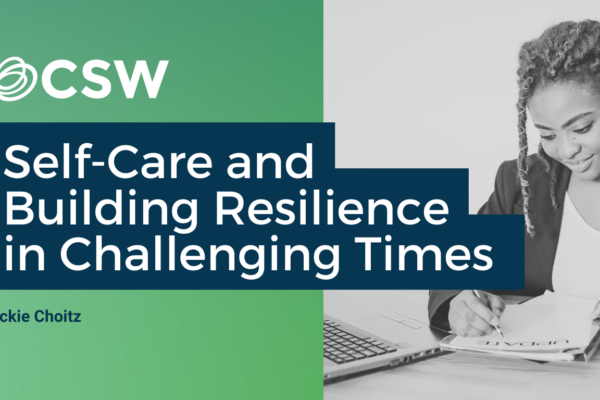
Self-Care and Building Resilience in Challenging Times
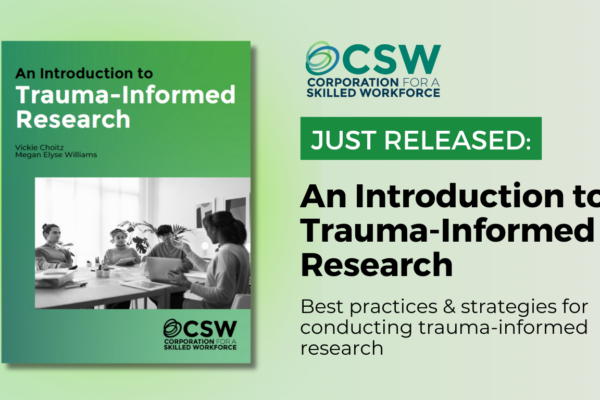
Just Released: An Introduction to Trauma-Informed Research PDF
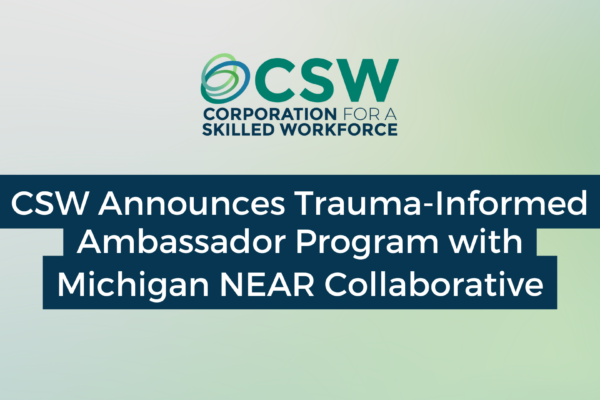
CSW Announces Trauma-Informed Ambassador Program with MI NEAR Collaborative
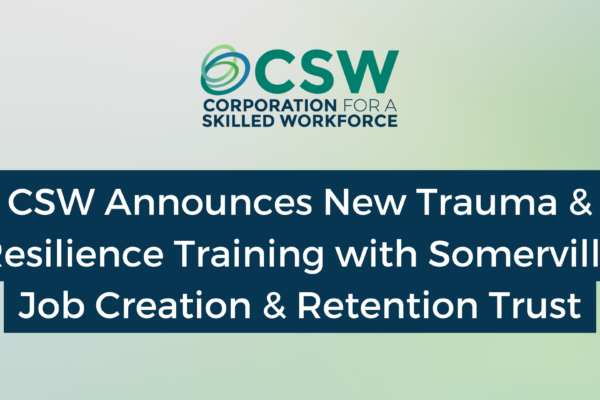
CSW Announces New Trauma & Resilience Training with Somerville Job Creation & Retention Trust
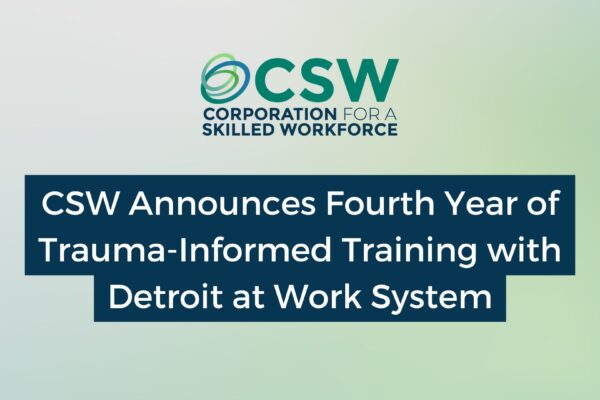
CSW Announces Fourth Year of Trauma-Informed Training with Detroit at Work System
Healing from Community Violence: Resources & Suggestions
Due to ongoing community violence, we would like to reshare our blog: How to Promote Workplace Healing and Resilience Following Community Violence. In addition, we want to highlight the below three strategies to aid in the healing.
- Hold space in all staff meetings to acknowledge current events and allow staff to process.
- Consider establishing a standing grief circle to provide emotional support to staff.
- Work to create an overall workplace culture that is trauma-informed and resilience-building.
Practical resources for conducting grief and healing circles are:
- Basic Guidelines for Calling a Circle from the Circle Way: an informative two-page guide for calling and facilitating a circle.
- Virtual Grief Circles: A Hosting Guide from the Circle Way: an in-depth guide to hosting virtual grief circles from how to invite folks and prepare as the host; the agenda and flow of the session itself; and how to follow up afterwards.
- SAMHSA Disaster Distress Helpline: call or text 1-800-985-5990 for crisis counseling and support to people experiencing emotional distress related to natural or human-caused disasters. Available 24/7, 365 days a year.
- Grief and Healing Circles Script: provides an agenda template for use as a crisis intervention as a first step in hopefully subsequent circles.
- Trauma-Informed Restorative Practices: defines trauma; lists potential causes of trauma and trauma stress responses/symptoms; and includes guiding questions and tips for facilitating.
- How to talk as a classroom about gun violence in schools: provides specific steps, activities, and examples using real-life school shooting incidents.
Meet the Trauma & Resilience at Work Team:
Vickie Choitz
Director of Trauma & Resilience at Work
Patricia Maguire
Senior Policy Associate
Aaron Cadayong
Intern


